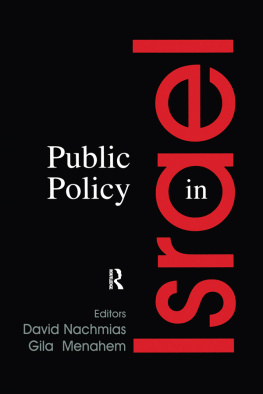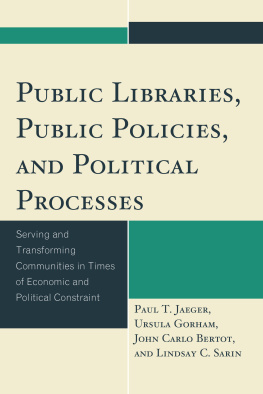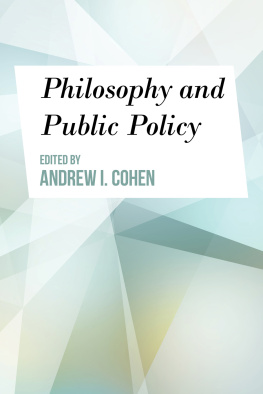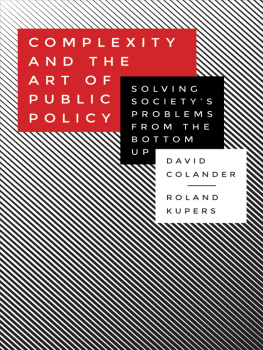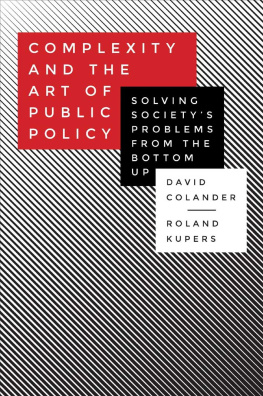PUBLIC POLICY IN ISRAEL
CASS SERIES: ISRAELI HISTORY, POLITICS AND SOCIETY
Series Editor: Efraim Karsh
ISSN: 1368-4795
This series provides a multidisciplinary examination of all aspects of Israeli history, politics and society, and serves as a means of communication between the various communities interested in Israel: academics, policy-makers, practitioners, journalists and the informed public.
Peace in the Middle East: The Challenge for Israel, edited by Efraim Karsh.
The Shaping of Israeli Identity: Myth, Memory and Trauma, edited by Robert Wistrich and David Ohana.
Between War and Peace: Dilemmas of Israeli Security, edited by Efraim Karsh.
U.S.-Israeli Relations at the Crossroads, edited by Gabriel Sheffer.
Revisiting the Yom Kippur War, edited by P. R. Kumaraswamy.
Israel: The Dynamics of Change and Continuity, edited by David Levi-Faur, Gabriel Sheffer and David Vogel.
In Search of Identity: Jewish Aspects in Israeli Culture, edited by Dan Urian and Efraim Karsh.
Israel at the Polls, 1996, edited by Daniel J. Elazar and Shmuel Sandler.
From Rabin to Netanyahu: Israels Troubled Agenda, edited by Efraim Karsh.
Fabricating Israeli History: The New Historians, second revised edition, by Efraim Karsh.
Divided Against Zion: Anti-Zionist Opposition in Britain to a Jewish State in Palestine, 1945-1948, by Rory Miller.
Peacemaking in a Divided Society: Israel After Rabin, edited by Sasson Sofer.
A Twenty-Year Retrospective of Egyptian-Israeli Relations: Peace in Spite of Everything, by Ephraim Dowek.
Global Politics: Essays in Honour of David Vital, edited by Abraham Ben-Zvi and Aharon Klieman.
Parties, Elections and Cleavages; Israel in Comparative and Theoretical Perspective, edited by Reuven Y. Hazan and Moshe Maor.
Israel at the Polls 1999, edited by Daniel J. Elazar and M. Ben Mollov.
Public Policy in Israel, edited by David Nachmias and Gila Menahem.
Israel: The First Hundred Years (Mini Series), edited by Efraim Karsh.
Israels Transition from Community to State, edited by Efraim Karsh.
From War to Peace? edited by Efraim Karsh.
Politics and Society Since 1948, edited by Efraim Karsh.
Israel in the International Arena, edited by Efraim Karsh.
Public Policy in Israel
Edited by
David Nachmias
and
Gila Menahem
First published in 2002 by
FRANK CASS PUBLISHERS
This edition published 2014 by Routledge
2 Park Square, Milton Park, Abingdon, Oxon, OX14 4RN
711 Third Avenue, New York, NY 10017
Routledge is an imprint of the Taylor & Francis Group, an informa business
Copyright 2002 Frank Cass & Co. Ltd
British Library Cataloguing in Publication Data
Public policy in Israel. (Israeli history, politics and
society ; v. 17)
1.Political planning Israel 2.Israel Politics and
government
I.Nachmias, David II.Menahem, Gila
320.609569409049
ISBN 0 7146 5090 0 (cloth)
ISBN 0 7146 8131 8 (paper)
ISSN 1378-4795
Library of Congress Cataloging-in-Publication Data
Public policy in Israel / editors, David Nachmias and Gila Menahem.
p. cm. -- (Israeli history, politics, and society, ISSN
1368-4795)
Includes bibliographical references and index.
ISBN 0-7146-5090-0 -- ISBN 0-7146-8131-8
1. Political planning -- Israel. 2. Israel -- Politics and government.
I. Nachmias, David. II. Menachem, Gila. III. Series.
JQ1830.A56 P645 2001
3206095694 -- dc21
2001004706
This group of papers first appeared as Public Policy in Israel, a special issue of Israel Affairs, Vol.7, No.4 (Summer 2001), published by Frank Cass and Co. Ltd
All rights reserved. No part of this publication may be reproduced, stored in or introduced into a retrieval system or transmitted in any form or by any means, electronic, mechanical, photocopying, recording or otherwise, without the prior written permission of the publishers of this book.
Contents
David Nachmias
and Itai Sened
Water Policy in Israel 19482000: Policy Paradigms,
Policy Networks and Public Policy
Gila Menahem
The Evolvement of Neighbourhood Activism and
the Extension of Citizenship Rights
Shlomo Hasson
Policy Think-Tanks: The Experience of the Israel
Democracy Institute
Arik Carmon
The Transferability of New Public
Management Reforms: Caveats from Israel
David Rosenbloom
and Allon Yaroni
The High Court of Justice and the Shaping
of Public Policy: Equality and Gender
Mordechai Kremnitzer
Israels State Comptroller and Public
Administration
Ira Sharkansky
Social Welfare Policy in Israel: Developments
in the 1980s and 1990s
Abraham Doron
Housing Policy in Israel: Review, Evaluation
and Lessons
Naomi Cannon
Bringing Order to Chaos? Educational Policy in
Israel in the Postmodern Era
Abraham Yogev
Turning Government Hospitals into Trusts:
An Assessment of the Israeli Case
Arie Shirom
Public Transportation Policy in Israel:
Challenges for the Decade Ahead
Robert E. Paaswell
and Joseph Berechman
Acknowledgement
This volume is based on research carried out at the Israel Democracy Institute, which published early versions of the studies in Hebrew. The editors wish to thank the Israel Democracy Institute for its support and assistance. The editors also wish to thank Nancy Strichman for her assistance.
DAVID NACHMIAS and ITAI SENED
As the state of Israel is celebrating its 50th anniversary, a pervasive sense of uncertainty and apprehension over the future direction of foreign and domestic public policies overshadows its impressive achievements. The peace process initiated by the Labour-led coalition government has stalled, and the domestic roles of the state, its scope, boundaries and its governing institutions have been profoundly challenged in ways that would have appalled the nations founding elite. Political reforms and economic liberalization measures have been implemented and a new generation of leaders, more pragmatic and technocratic in orientation and less compelled by traditional ideologies and party organizations, have ascended to power positions. According to astute observers of Israeli politics, the second republic has been emerging.1 At the same time, economic, social and political cleavages have intensified, resulting in public policies characterized by greater contradictions, fragmentation and incoherence.
In democracies, perhaps inevitably, public policies tend to be contradictory and to exhibit a certain measure of fragmentation and incoherence as a consequence of the political inclination of policy-makers to pursue mutually inconsistent objectives at one and the same time.2 Even on occasions when the design of an optimal policy is feasible and political expediency is temporarily restrained, the problem of dynamic inconsistency prevails. That is, there is always a discrepancy between the optimal policy in the long run and the optimal policy at any given time.3 In this context, institutional designs make a great difference. Properly conceived and implemented, they can lessen policy contradictions, moderate fragmentation and reduce incoherence.4

